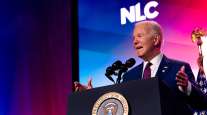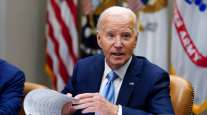Senior Reporter
Republicans Counter Biden With $568 Billion Infrastructure Plan

[Ensure you have all the info you need in these unprecedented times. Subscribe now.]
A $568 billion plan that focuses on surface transportation connectivity improvements and greater access to broadband internet for rural residents was unveiled by the Republican leadership in the U.S. Senate April 22.
The Republican plan prioritizes funding for roads, bridges, transit, airports, ports, broadband and waterways. Congressional Democrats, meanwhile, are readying consideration of the White House’s $2.25 trillion infrastructure plan, which proposes to fund projects beyond surface transportation systems.
“What we ought to do is make sure we’re focusing on the needs of the American people,” said Sen. John Barrasso (R-Wyo.). “It’s time to say we want to do things that are really in the best interest to the American people, what the American people are asking for.” As chairman of the Republican Conference, he is the third highest-ranking Republican in the Senate.
The Republican Roadmap by Transport Topics on Scribd
Under the Republican proposal, nearly $300 billion would be dedicated for improvements to roads and bridges, $65 billion would boost programs specific to broadband, $61 billion would fund transit systems, $44 billion would back operations at airports and $13 billion would fund programs at agencies, such as the Federal Motor Carrier Safety Administration.
According to background information provided by the senators, the plan’s framework “is meant to serve as a guide as we continue to develop bipartisan bills that will move by regular order.”
Their plan also would promote expediting the environmental and permitting review process for infrastructure projects, facilitating private sector involvement in the construction process and enhancing programs for deploying new technologies.
“We’re ready to sit down and get to work on this,” said Sen. Shelley Moore Capito (R-W.Va.), ranking member on the Environment and Public Works Committee. “The biggest message we want to put forward today is that this is important to us.”
Sen. Roger Wicker (R-Miss.), the Commerce Committee’s ranking member, added: “This is a big proposal. A billion dollars is a lot of money; $568 billion is a lot of money.”
Funding principles outlined in the GOP plan include calls for avoiding increases in the country’s debt, addressing the looming funding crisis associated with the Highway Trust Fund, ensuring every motorist contributes to maintenance and repairs, and repurposing unused federal spending. Depleting revenue from the 24.4 cents-per-gallon diesel tax and 18.4 cents-per-gallon gas tax is insufficient to meet the Highway Trust Fund’s obligations. The current fuel rates were set in 1993.
Republicans also call for preserving the 2017 Trump tax cuts, specifically rejecting increases to corporate tax rates. The primary funding mechanism of President Joe Biden’s American Jobs Plan on infrastructure would entail raising the corporate tax rate from 21% to 28%.
For weeks, Republicans on Capitol Hill have criticized the Biden plan’s source of funding, as well as its expansive policy proposals. Senate Minority Leader Mitch McConnell (R-Ky.) recently suggested focusing narrowly on surface transportation policy would be welcomed by his caucus.
“We’re open to a more modest and targeted infrastructure bill,” he said. “It’s one thing to run up the national debt when you have a 100-year pandemic. But just to keep routinely adding trillions of dollars to the national debt — I think it’s ill-advised to the future of the country. For myself, I’d like to see how even a modest bill is going to be credibly paid for.”
The Republican plan was unveiled as the White House revealed its aim for reducing greenhouse gas emissions by 50% to 52% this decade, and also as a House transportation panel plans to consider a multiyear highway policy bill next month.
Sen. Tom Carper (D-Del.), chairman of the Environment and Public Works Committee, intends to help realize the president’s infrastructure and climate change objectives. He signaled the potential for considering a highway policy bill sometime this summer. “We can protect our planet and strengthen our nation’s economy today and for future generations to come,” said Carper.
As part of the president’s infrastructure plan, net-zero carbon emissions would be achieved by 2050. The plan would provide $115 billion for highways and bridges, $85 billion for transit systems, $25 billion for airports and $17 billion for inland ports. The plan also would propose funding 500,000 electric vehicle charging stations nationwide.
“Legislating takes compromise, and it’s encouraging to see Republicans, led by Sen. Shelley Moore Capito, present their proposal for addressing our nation’s pressing infrastructure needs,” said American Trucking Associations President Chris Spear. “This proposal is a good start and more in line with the investment by last year’s House transportation bill led by Transportation and Infrastructure Chairman Peter DeFazio. The trucking industry, along with all Americans who utilize our roads and bridges, know that the time for infrastructure investment is overdue.
“We need more members of Congress willing to work together on critical priorities and cheer the efforts by the president and the Republicans and Democrats in Congress who are brave enough to try and find a consensus.”
Reacting to the GOP’s announcement, the U.S. Chamber of Commerce pressed congressional policymakers to pursue a bipartisan approach during their negotiations.
“Those who declare negotiations as futile before they have even begun are the ones standing in the way of long-overdue investments in our nation’s infrastructure,” said Neil Bradley, the chamber’s executive vice president and chief policy officer. “The Chamber continues to urge both parties to maintain America’s traditional user-financed model of funding infrastructure and to pay for new investment over an extended period of time just like the private sector does. Lawmakers should reject broad-based tax increases that would make American employers uncompetitive and cost America jobs.”
Want more news? Listen to today's daily briefing below or go here for more info:




